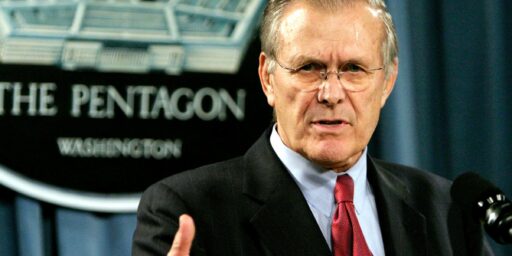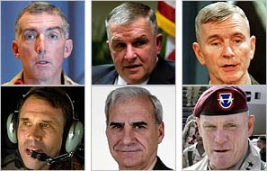SILENCING THE RESERVISTS?
Newsweek presents a strange piece contending that SECDEF Don Rumsfeld is trying to undermine a carefully-crafted “strategic check-and-balance” put in place after Vietnam: putting vital troops in reserve to make mobilizing them without public support harder.
What Rumsfeld is actually doing–or trying to do–is something many of us have been calling for since Somalia:
Right now there are U.S. soldiers in Iraq doing nothing to rebuild Iraq because they’re only trained to fire artillery, or because they drive gas trucks and only drive gas trucks–and the Army isn’t firing artillery anymore and is using just a fraction of the gas it needed during heavy combat. But because troops are deployed in divisions, they come home that way, too. Rumsfeld wants to break down divisions–the Third Infantry Division and the 101st Airborne Division look to be first up–and deploy brigades that bring to battle only what’s relevant to the task at hand. In other words, he wants to downsize “big Army” into something more akin to nimble Special Operations units. (That’s why he tapped retired general Peter Schoomaker, former head of the Special Forces, as chief of staff of the Army.)
Critics–including Congress and some military officers–are asking whether this downsizing would simply make it easier for the United States to rush to war. Rumsfeld’s proposed “rebalancing” would convert the most heavily used reserve jobs (military police, civil affairs, psychological operations) into active-duty Army positions. That would effectively reduce the number or reservists—and the number of complaints–needed for full-scale military operations.
Rumsfeld says he’s trying to be fair. “You end up calling them [the Reserves] up over and over,” he said during a question-and-answer session on Sept. 25, “and that’s not fair to their families, and it’s not fair to their employers, and we’ve got to fix that.” But his plan will blunt the Abrams Doctrine. It will also, notes the brass in charge of the Reserves, blunt the skills of future civil-affairs soldiers because as reservists, civil-affairs soldiers hone their craft when they’re demobilized and working their law-and-order and government jobs back in the United States.
Rumsfeld’s “rebalancing” is a five-year plan. So it won’t fix the Bushies’ immediate political problem. But it might grease the skids for America’s next war.
I agree with both of these moves as well as Rummy’s logic. While it’s true that the Vietnam-era policy served a useful purpose, it’s also true that it was based on an entirely different strategic paradigm. During the Cold War, the force was going to be deployed en masse or not at all. Since 1989 (starting with Just Cause in Panama), there have been well over a dozen military deployments. The same forces are being used over and again because the skills required for peace operations are in limited quantity. The “strategic check” hasn’t stopped that. It’s time to face reality.





Well, of course, the debate about whether we should be getting ourselves into these kind of messes in the first place seems like something we should have. I seem to remember a lot of talk from the right side of the isle during Clinton’s regime about such things.
There is a saying I have on my office wall: A lack of planning on your part does not constitute a crisis on my part.
This crisis is in large part a manufactured crisis caused by ill conceived planning and a faulty premise.
I agree that it’s a crisis. And thanks to the collective nature of our society it now becomes my crisis.
But I think the real solution is to simply stop doing stupid things in the first place. Not to figure out how to build up a larger force that is simply designed to clean up behind the elephants stomping around aimlessly.
But it isn’t a matter of a larger force; it’s smaller. It’s a question of no longer having the military equivalent of a third of your force consisting of horse cavalry in an age of tanks. It’s not that we need more of what we have, but less of a lot of what we have and more of certain elements. That’s legitimate restructuring, not wasteful spending.
And, certainly, there has been a lot of opposition from both sides to peace ops. The difference between this and the Clinton era interventions is that no one argued that Somalia, Bosnia, etc. impacted US national security; some argue Iraq does/did. Bill Kristol and the neocons pretty much supported all the interventions then and now, though.
That’s an interesting way of looking at it. But it’s kind of in opposition to a policy that – at least appears to these liberal eyes – requires a large standing military that can decisively and quickly win large scale conflicts.
So while I actually agree with your views on this, I don’t think that will be the outcome of the administration’s policies.
Thanks for the response.
Our current force is really too large still in terms of our needs for maneuver warfare. The level of our potential opponents and our high tech, skilled forces are no match. The problem is “light” duty like peacekeeping and various constabulary missions. So, to pull numbers out of the air, we could eliminate a division of armor and one of infantry and train up several battalions worth of MPs, Psyops, and Civil Affairs types, still have a smaller force, and have more than enough capability for warfighting. And actually reduce the optempo at the individual soldier level since we’d vastly expand the base of the type of troops needed for the duties that take months and years to accomplish.
—